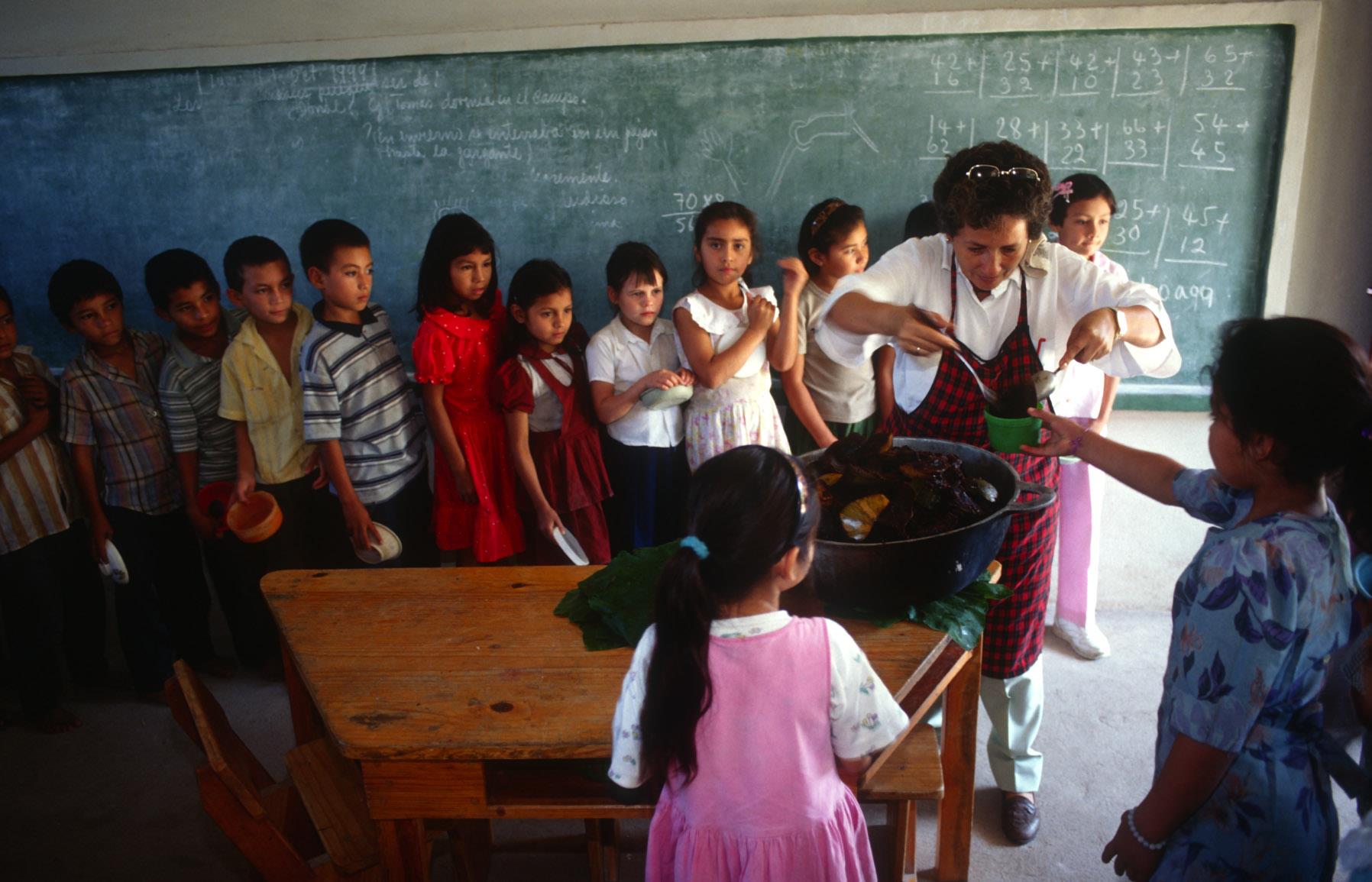To reduce inequality, focus on hunger and extreme poverty
FAO Director-General urges UN forum to consider measures enabling rural smallholders to prosper

Rural students line up for a school lunch in Honduras.
©Photo: ©FAO/Giuseppe Bizzarri
30 March 2016, New York - Absolute levels of hunger and poverty are the most dramatic issues when it comes to addressing inequality, FAO Director-General Jose Graziano da Silva said today at a UN conference convened to discuss what in recent years has become one of the world's most pressing public policy themes.
"The most pressing priority in terms of inequality is to help those people that are still living in extreme poverty and suffering from hunger," Graziano da Silva said at a Special Meeting on Inequality held by ECOSOC, the United National Economic and Social Council.
Inequality, both within and among countries, can threaten economic growth and reducing it is an explicit aim of SDG-10, a key component of the 2030 Sustainable Development Agenda agreed on by all United Nations members last year. FAO's Director-General focused on the link between inequality and food insecurity in rural areas.
Some 80 percent of the world's population suffering from hunger and extreme poverty live in rural areas, where many depend on agriculture but have access only to degraded natural resources such as land and water.
On top of that, the world already has enough food "to feed every person," underscoring how insufficient access to food rather than insufficient production is the main cause of hunger, he said.
Addressing the gap entails acknowledging that poor consumers do not always have the income to buy the food they need, and subsistence farmers do not always have the means to produce enough food to feed their families, he added.
Global themes
Policy decisions at the global level can aggravate or help improve local situations in which inequality is a problem, Graziano da Silva said, urging consideration of the concept of a fair price for food over pursuit of cheap food.
For decades, intensified food production, coupled with policy decisions such as export subsidy schemes, import limits and practices bearing high environmental costs , made it easier for European, North American and South American countries to export foods - albeit at a high environmental cost - at a time when fiscal and financial constraints forced many developing countries to drastically reduce investment in their own agriculture, he noted. One result was that family farmers often could not compete with cheap imported food.
Fostering more sustainable food systems, ensuring intergenerational equity and encouraging the strengthening of local food production in developing countries must now be guiding principles, he said.
FAO welcomed the results of the World Trade Organization Ministerial Meeting held in Nairobi last December, as the agreements point towards eliminating agricultural export subsidies while allowing developing countries to continue stockpiling public food stocks to ensure food security. Public stocks can be used for various purposes, including guaranteeing stable markets for family farmers and minimizing excessive food price volatility, Graziano da Silva said.
The Agricultural Market Information System (AMIS) set up by FAO at the request of the G-20 is an instrument that contributes to curbing volatile prices an creating more stable food markets that minimize risks for poor producers and consumers alike, he said. It also provides a forum for coordinated policy responses if prices do move suddenly, as may be more likely due to climate change, he added.
Another way to contrast international inequality is to protect developing countries form excessive natural resource exploitation, from which they benefit the least but to which they are highly exposed.
FAO's Director-General pointed to illegal and unreported fishing as an example. The agency has promoted the Port State Measures Agreement to pursue that goal, and it will shortly go into effect once 25 countries have ratified it. With Cuba's accession last week, 24 states have so far done so.
On the national front
National governments have ample scope to take pro-poor action to mitigate inequality, such as measures to support family farmers and their organizations, improve access to land, water, credit, agricultural inputs, marketing, training and research, Graziano da Silva said.
Stronger social protection programme can provide a buffer in times of need and at times offer help to invest in productive assets, he added. Bringing productive and social support policies together for added benefits is the "innovation we need," he said, citing examples that link family farming to school meals and to cash transfers, which stimulates both production and consumption in local economies.
FAO devoted the 2015 edition of its benchmark The State of Food and Agriculture report to ways social protection can be used to foster sustainable rural development.
Contact
Christopher Emsden FAO News and Media (Rome) (+39) 06 570 53291 [email protected]
